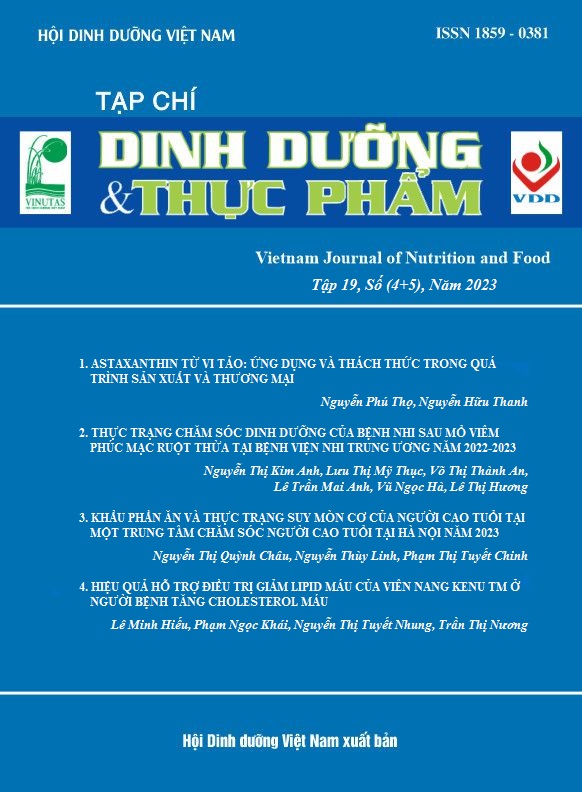HIỆU QUẢ HỖ TRỢ ĐIỀU TRỊ GIẢM LIPID MÁU CỦA VIÊN NANG KENU TM Ở NGƯỜI BỆNH TĂNG CHOLESTEROL MÁU
Nội dung chính của bài viết
Tóm tắt
Mục tiêu: Đánh giá hiệu quả của viên nang Kenu TM trong hỗ trợ giảm lipid máu ở người bệnh tăng cholesterol máu.
Phương pháp: Thử nghiệm lâm sàng ngẫu nhiên có đối chứng, nhãn mở trên 487 người từ 30-79 tuổi có tăng cholesterol máu. Đối tượng nghiên cứu được chia làm hai nhóm: nhóm nguy cơ tim mạch cao (NCC) và nhóm nguy cơ tim mạch thấp (NCT) theo khuyến cáo của Hiệp hội Tim và Hiệp hội nghiên cứu và điều trị bệnh tim Hoa Kỳ 2018. Trong mỗi nhóm, người bệnh được phân ngẫu nhiên vào nhóm can thiệp và đối chứng. Nhóm can thiệp sử dụng viên nang Kenu TM trong 3 tháng.
Kết quả: Nhóm can thiệp, sau 3 tháng, nồng độ cholesterol máu giảm nhiều hơn so với nhóm đối chứng (nhóm NCT: 0,9±1,4 so với -0,1±1,9; NCC:0,9±1,4 so với 0,1±1,0 mmol/L), p < 0,05. Viên nang Kenu TM có tác dụng giảm số bệnh nhân tăng cholesterol máu 1,7 lần với RR(95%CI): 1,7(1,1-2,5) ở nhóm NCT và 2,6 lần với RR(95%CI): 2,6(1,6-4,3) ở nhóm NCC so với nhóm đối chứng. Nhóm can thiệp, sau 3 tháng, nồng độ triglyceride máu giảm nhiều hơn so với nhóm đối chứng (nhóm NCT: 1,2 ± 2,4 so với -0,8 ± 2,5; và NCC:1,5 ± 3,2 so với -0,7 ± 3,2 mmol/L), với p< 0,05.
Kết luận: Viên nang Kenu TM có thể có tác dụng hạ cholesterol, triglyceride máu sau 3 tháng.
Từ khóa
Tăng cholesterol máu, 𝘓𝘢𝘤𝘵𝘰𝘣𝘢𝘤𝘪𝘭𝘶𝘴 𝘱𝘭𝘢𝘯𝘵𝘢𝘳𝘶𝘮
Chi tiết bài viết
Tài liệu tham khảo
2. Bui TV, Blizzard CL, Luong KN, et al. National survey of risk factors for non-communicable disease in Vietnam: prevalence estimates and an assessment of their validity. BMC Public Health. 2016;16. doi:10.1186/s12889-016-3160-4
3. Grundy Scott M., Stone Neil J., Bailey Alison L., et al. 2018 AHA/ACC/AACVPR/AAPA/ABC/ACPM/ADA/AGS/APhA/ASPC/NLA/PCNA Guideline on the Management of Blood Cholesterol. J Am Coll Cardiol. 2019;73(24):e285-e350. doi:10.1016/j.jacc.2018.11.003
4. Kiessling G, Schneider J, Jahreis G. Long-term consumption of fermented dairy products over 6 months increases HDL cholesterol. Eur J Clin Nutr. 2002;56(9):843-849. doi:10.1038/sj.ejcn.1601399
5. Fuentes MC, Lajo T, Carrión JM, Cuñé J. A randomized clinical trial evaluating a proprietary mixture of Lactobacillus plantarum strains for lowering cholesterol. Mediterr J Nutr Metab. 2016;9(2):125-135. doi:10.3233/MNM-160065
6. Rerksuppaphol S, Rerksuppaphol L. A Randomized Double-blind Controlled Trial of Lactobacillus acidophilus Plus Bifidobacterium bifidum versus Placebo in Patients with Hypercholesterolemia. J Clin Diagn Res JCDR. 2015;9(3):KC01-04. doi:10.7860/JCDR/2015/11867.5728
7. Ml J, Cj M, S P. Cholesterol lowering and inhibition of sterol absorption by Lactobacillus reuteri NCIMB 30242: a randomized controlled trial. Eur J Clin Nutr. 2012;66(11). doi:10.1038/ejcn.2012.126
8. Hidalgo NJ, Pando E, Alberti P, et al. The role of high serum triglyceride levels on pancreatic necrosis development and related complications. BMC Gastroenterol. 2023;23(1):51. doi:10.1186/s12876-023-02684-9
9. Miller M, Stone NJ, Ballantyne C, et al. Triglycerides and Cardiovascular Disease. Circulation. 2011;123(20):2292-2333. doi:10.1161/CIR.0b013e3182160726
10. Mikelsaar M, Sepp E, Štšepetova J, et al. Regulation of plasma lipid profile by lactobacillus fermentum (probiotic strain ME-3 DSM14241) in a randomised controlled trial of clinically healthy adults. BMC Nutr. 2015;1(1):27. doi:10.1186/s40795-015-0020-z.
Các bài báo tương tự
- Huỳnh Hạnh, HÌNH THÀNH THÓI QUEN TRONG VIỆC NGĂN NGỪA CÁC BỆNH KHÔNG LÂY NHIỄM , Tạp chí Dinh dưỡng và Thực phẩm: Tập 13 Số 5 (2017)
Ông/Bà cũng có thể bắt đầu một tìm kiếm tương tự nâng cao cho bài báo này.


